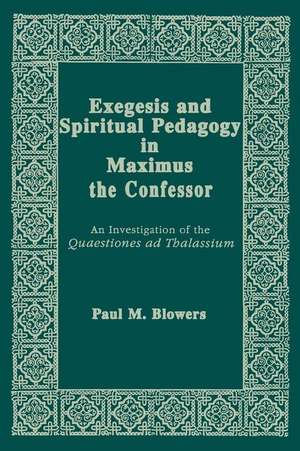Exegesis and Spiritual Pedagogy in Maximus the C – An Investigation of the Quaestiones Ad Thalassium: Christianity and Judaism in Antiquity
Autor Paul M. Blowersen Limba Engleză Paperback – 30 iul 2017
Maximus the Confessor (580–662) is recognized by historians of Christian thought for his contributions to philosophical theology in the Eastern Christian tradition. His second largest work, the Quaestiones ad Thalassium, is a collection of his responses to a wide variety of questions on problematic or obscure scriptural texts that his friend the Libyan monk Thalassius had posed to him. Earlier studies of Maximus’s theology have used and cited the Quaestiones ad Thalassium as a source, but this book is the first specialized study of this comprehensive work in its own right.
Paul M. Blowers examines Maximus’s role as an expositor of scripture and spiritual father in the Byzantine monastic tradition, illuminating the relationship between Maximus the philosopher-theologian and Maximus the monastic pedagogue. The first two chapters break new ground in exploring the genre, history, and monastic context of the Quaestiones ad Thalassium. The book then outlines Maximus’s hermeneutical theology and exegetical methodology as shaped within his larger system of thought. Translated excerpts from the Quaestiones ad Thalassium are interwoven into this study to give the reader greater access to Maximus’s own discourses.
Paul M. Blowers examines Maximus’s role as an expositor of scripture and spiritual father in the Byzantine monastic tradition, illuminating the relationship between Maximus the philosopher-theologian and Maximus the monastic pedagogue. The first two chapters break new ground in exploring the genre, history, and monastic context of the Quaestiones ad Thalassium. The book then outlines Maximus’s hermeneutical theology and exegetical methodology as shaped within his larger system of thought. Translated excerpts from the Quaestiones ad Thalassium are interwoven into this study to give the reader greater access to Maximus’s own discourses.
| Toate formatele și edițiile | Preț | Express |
|---|---|---|
| Paperback (1) | 240.42 lei 6-8 săpt. | |
| MR – University of Notre Dame Press – 30 iul 2017 | 240.42 lei 6-8 săpt. | |
| Hardback (1) | 590.28 lei 6-8 săpt. | |
| MR – University of Notre Dame Press – 30 aug 1991 | 590.28 lei 6-8 săpt. |
Preț: 240.42 lei
Nou
Puncte Express: 361
Preț estimativ în valută:
46.00€ • 48.13$ • 38.22£
46.00€ • 48.13$ • 38.22£
Carte tipărită la comandă
Livrare economică 02-16 aprilie
Preluare comenzi: 021 569.72.76
Specificații
ISBN-13: 9780268048846
ISBN-10: 0268048843
Pagini: 304
Dimensiuni: 152 x 227 x 22 mm
Greutate: 0.45 kg
Ediția:1st Edition
Editura: MR – University of Notre Dame Press
Seria Christianity and Judaism in Antiquity
ISBN-10: 0268048843
Pagini: 304
Dimensiuni: 152 x 227 x 22 mm
Greutate: 0.45 kg
Ediția:1st Edition
Editura: MR – University of Notre Dame Press
Seria Christianity and Judaism in Antiquity
Recenzii
"[F]ew studies exist which focus on the context and scope of the individual writings left by the seventh-century saint from Byzantium. Blowers' book . . . contributes notably towards filling this gap. . . . Blowers has provided a solid study that should be of benefit not only for students of Maximus, but also for students of biblical hermeneutics." —Journal of Early Christian Studies
Notă biografică
Paul M. Blowers is Dean E. Walker Professor of Church History at Emmanuel Christian Seminary in Tennessee. He is the editor of The Bible in Greek Christian Antiquity (University of Notre Dame Press, 1997) and Drama of the Divine Economy: Creator and Creation in Early Christian Theology and Piety (2012).
Descriere
Descriere de la o altă ediție sau format:
Maximus the Confessor (580-662) is recognized by historians of Christian thought for his contributions to philosophical theology in the Eastern Christian tradition. Paul Blowers examines Maximus's role as an expositor of scripture and spiritual father in the Byzantine monastic tradition.
Maximus the Confessor (580-662) is recognized by historians of Christian thought for his contributions to philosophical theology in the Eastern Christian tradition. Paul Blowers examines Maximus's role as an expositor of scripture and spiritual father in the Byzantine monastic tradition.













